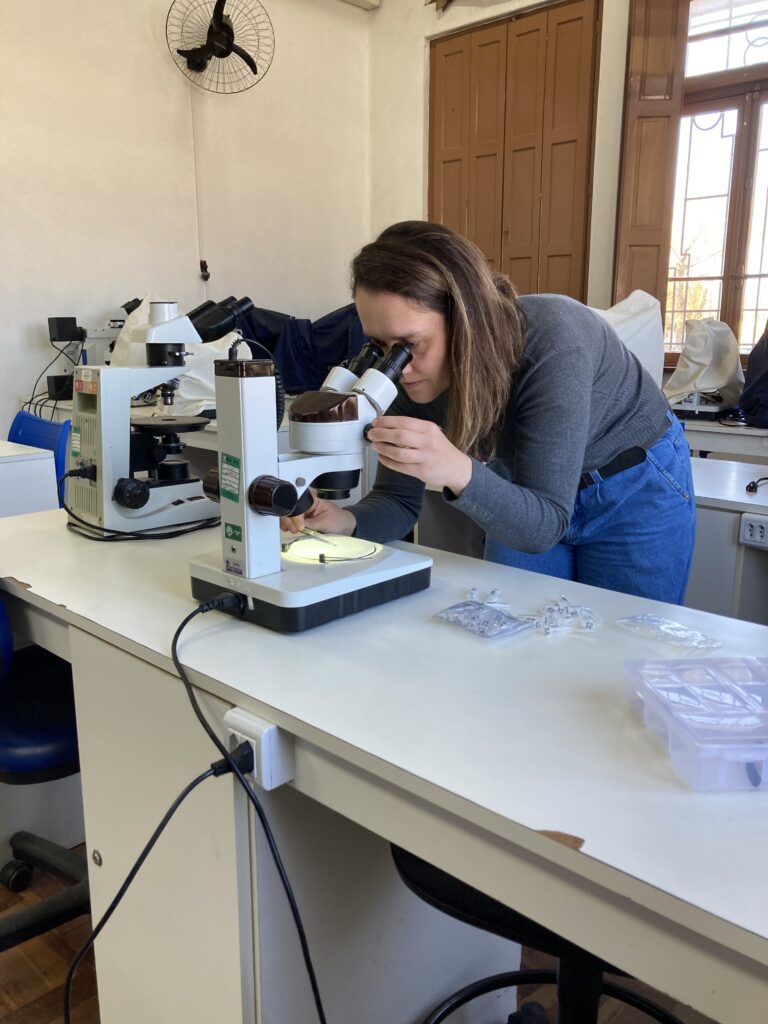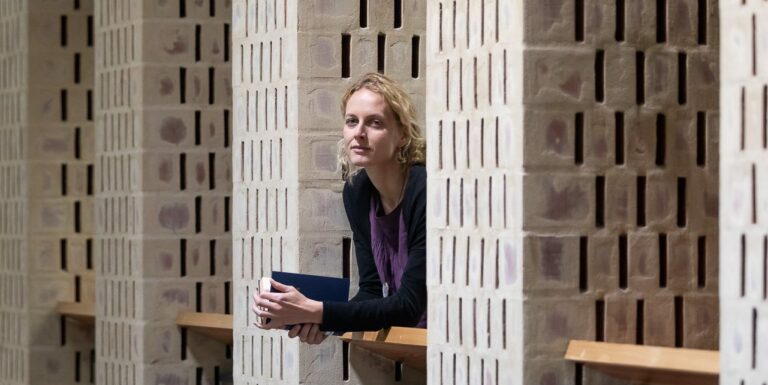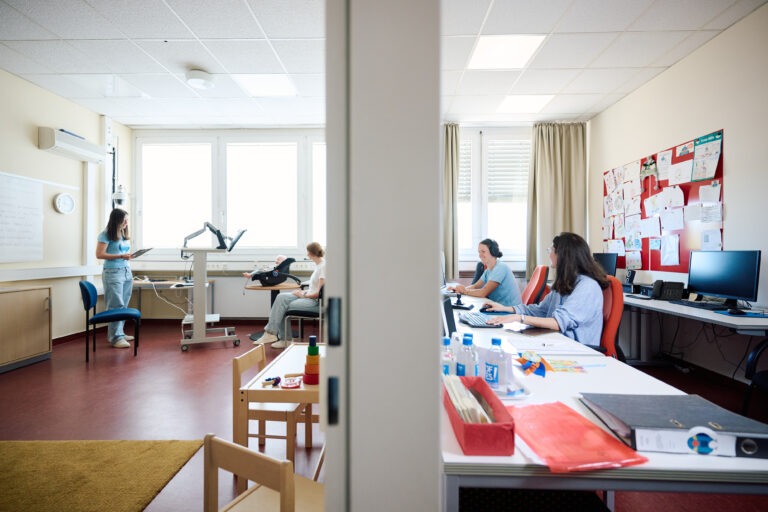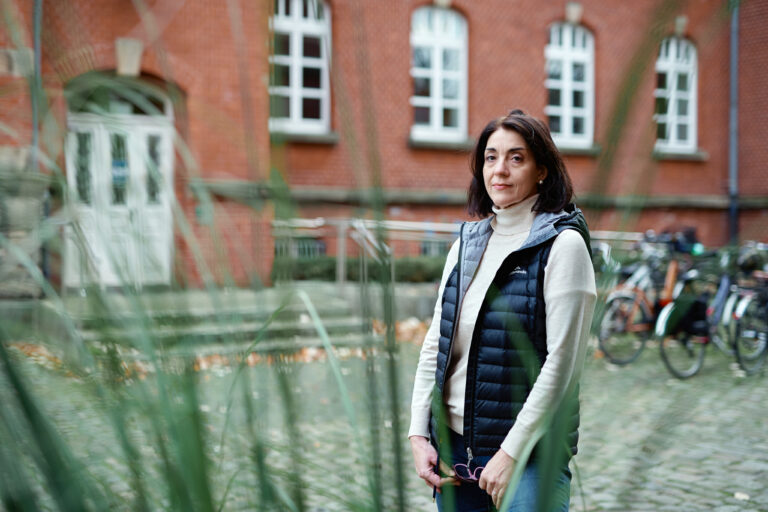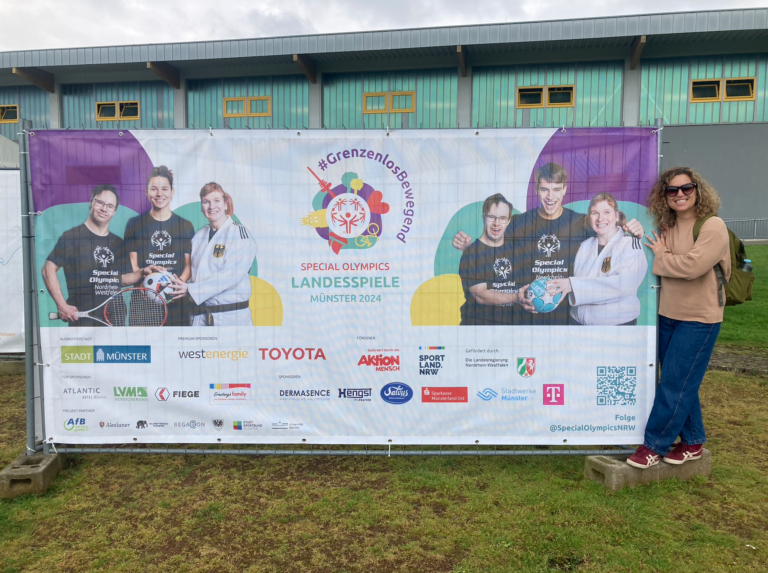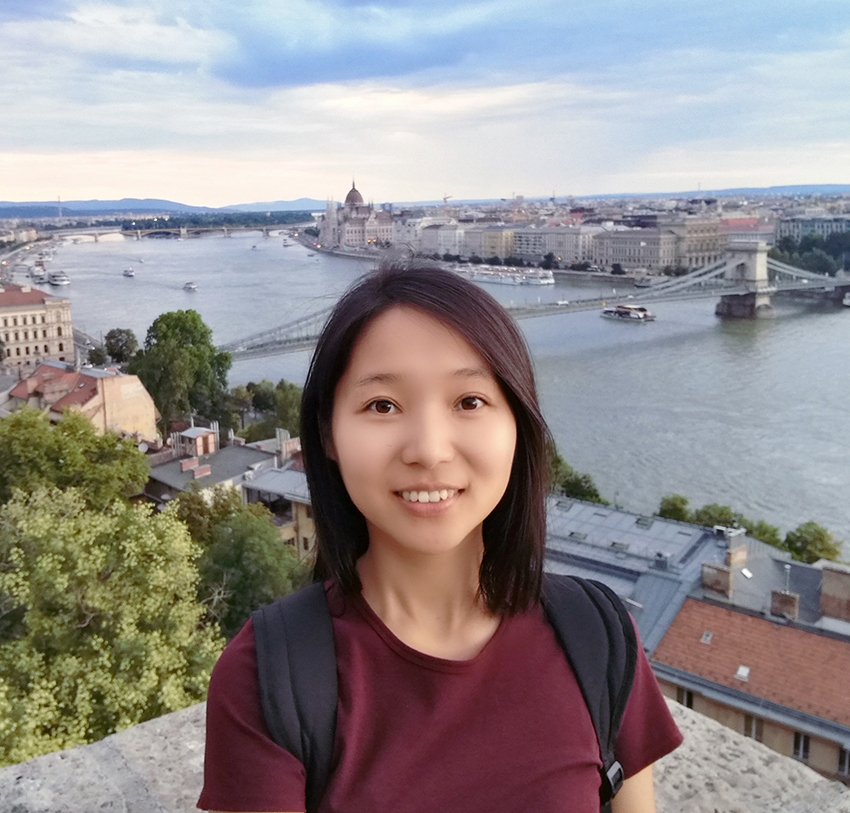
“Magic in Physics” – Exploring the Unknown with Physicist Dr. Yuchen Chen
In the series “33 questions” we introduce, in no particular order, our WiRe Fellows who are currently working on a research project here at the University of Münster. Why 33? Well, if we think of the rush hour of life, it is kind of the age that lies in its middle. And we also like the number😉.
In today’s episode we are speaking with Yuchen, physicist and passionate lover of functional materials.

1. What motivated you to work in the field of physics?
For me, what motivated me in this field could be divided into 3 aspects:
1) Desire to know more. It is human nature to explore the unknown.
2) Happiness brought by Truth. I was told that the ancient Greeks thought the Absolute Truth is solely held in the hands of “Gods”, I feel happy to take a peek at what’s inside “Gods’” hands, and to quest what is really behind the physical facts.
3) Evolving knowledge, always. What is believed to be true now could be proven wrong later. That’s how knowledge evolves. It is like we are living in a novel which is written by the nature, with the plots unrolling, our understanding evolves. It is always intriguing to see what the next problems and solutions will be.
2. Describe your daily work in three words.
Hypothesis, experiment, validation.
3. Describe your research topic in three words.
Materials performance improvement.

4. A good physicist needs…?
In my opinion, good physicists need a solid basis of knowledge, high level of execution capability, effective team work, moreover, they need to be humorous, fun and out-reaching.
5. What is the best experience you have had as a scientist / researcher?
The best experience is “the eureka moment”. That’s the moment after you got stuck in some mind-boggling scientific problems for some time, and then you finally find the exit of the mind-boggling maze: your existing experimental data, facts, theories, hypotheses can explain one another, the results turn to be promising and flourishing – then you are in the middle of the “the eureka moment”!
6. What was your biggest research disaster?
Research disaster? Umm… perhaps I am lucky; I did not have research disasters so far. This is because there are frequent presentations/ talks/ outreach activities I give or take part in with my colleagues and peers. So, I usually receive suggestions and feedback, which can foresee concerns and questions before they grow into problems or disasters.
7. Which (historical) important scientist would you like to have dinner with? What would you ask?
If there is only one chance to do such thing, I absolutely would like to have dinner with Niels Bohr, who is the founder of Quantum Mechanics.
I would ask him 1) how fierce the “Bohr–Einstein debates” were, and how he managed these with his colleagues; 2) his personal opinions towards Albert Einstein, how they maintained a mutual admiration in the rest of their lives after their debates, despite the fact that they had totally different opinions and discoveries on quantum mechanics.
8. If time and money were no object: Which research project would you like to do?
Morphing aircraft using shape memory alloys. Frankly speaking, in my understanding, for someone whose time and money were no object, this means he/she possesses the eternity as well as the whole world. That is to say, he/she is a God/Goddess, oops… From a human perspective, it is beyond our wisdom to guess what research a God/Goddess would like to do for humans. Moreover, for a scientist, to do research project means to do optimizations on time and resources.
9. What is your favorite research discipline other than your own?
Computer science. Because I usually develop programming scripts for specific scientific problems. Two days of script-writing can tackle two months work load of data analyses within one single day, which is overwhelmingly efficient and time-saving. That is why I appreciate very much the discipline of computer science.

10. What do you consider the greatest achievement in the history of science / your field?
That must be Sir Isaac Newton and his Theories of Classical Mechanics. Because before the era of Sir Isaac Newton, the natural phenomena people experienced in daily life were attributed to Gods/Evils/Fate/Magic etc. Therefore, in that era, people relied on beliefs in superstitions and practices of astrology, fortune telling, witchcraft, etc., which were irrational. Sir Isaac Newton and his Classical Mechanics reveals nature and nature’s laws, so people could formulate the distinctions between science, superstition, and pseudoscience. Just as the English Poet Alexander Pope said, “Nature and nature’s laws lay hid in the night. God said, Let Newton be! And all was light!”.
11. Which experience in the world of science disappointed you most?
Some research results could be catastrophic and their bad effects can last for generations. For example, the Psychologist and Behaviourist John Broadus Watson proclaimed in his 1928 book Psychological Care of Infant and Child that “children should be treated as miniature adults, because people do not receive excessive comfort in adulthood and therefore should not receive it in childhood,” and that “it is dangerous for a mother to provide ‘too much’ love and affection to children”.
Consequently, his followers subjected their own children to a harsh upbringing regime, including scheduled feedings and no physical affection. What was the result? It is reported that J.B. Watson had three sons and one daughter: two of his sons committed suicide, and his daughter also made several attempts to take her own life, his granddaughter also suffered from psychological issues that she attributed to her being raised with her grandfather’s theories.
Long story, but it is such a shame to see that some parents nowadays are still supporters of J.B. Watson (that his extreme ideas are still adopted), even though J.B. Watson himself was believed to be regretful for his research results, so he burned all of his unpublished work before he died.
So, I think the scientists should be humble regarding what is unknown and be skeptical about what is known (because knowledge keeps evolving), and most importantly, be responsible for those who will use your results.
12. What was the funniest moment you had in science?
It was the moment when my colleagues and I captured cosmic rays (alpha particles, muons, etc.) with our “kitchen-made Wilson-cloud chamber”. It cost almost nothing but was so fun to show and share the appearance of the bombarding cosmic rays.
13. How did you survive your PhD time?
I rather enjoyed my PhD time. My son “got on board” (pregnancy) during the very beginning of my PhD time. When he was still a foetus (capable of moving), he could be very quiet when I was working and very active when I was relaxing. I just appreciated so much how supportive he and my family were. I enjoyed every phase of his growth and my PhD time.
14. What direct or indirect relevance does your research have for society?
My researches on shape memory alloys (SMAs) have, for example, following relevance for society:
Health – Research on improvement of functional fatigue performance and corrosion-resistance of SMAs can bring more reliable and qualified orthodontic wires and artery stents which not only improve life quality but also save lives.
Environment and Engineering – SMA actuators are envisioned to be embedded into e.g. aircraft wings and wind-mill bladesin order to improve performance so as to ensure less consumption of non-renewable energy and more generation of renewable energy.
I used to think the relevance of my research for society is not very close to my daily life (after all, not everyone uses orthodontic wires or artery stents etc.), until one day my friend shared his father’s experience of heart surgery and artery stent implantation which is made of SMA and saved his father’s life. That moment of experience sharing gave me concrete thoughts and feelings how my research could benefit our society.


15. How did you imagine the life of a scientist / researcher when you were a high school student?
I can not recall exactly what I imaged it at that time. But I have the impression that I thought scientists/researchers are basically ordinary people. Their knowledge can make them talk very precisely but in the meantime, speaking of scientific/technical terminologies on casual occasions may make them seem somehow nerdy and clumsy, but I think it is another way of being lovely 😀
16. Is it actually different? In what way?
I think actually there is not much difference. We are ordinary people specializing in different domains.
17. What do you like most about the “lifestyle” of a scientist? And what least of it?
What I appreciate the most is, scientists solve problems in very creative ways, sometimes we can be as sophisticated as Swiss Army knives to tackle problems under limited conditions.
What least? Hmmm, it must be the fact that we are usually seated for a very long time, while preparing samples/ doing experiments/ analysing data.
18. Do you think your career would have evolved differently if you were a man?
Yeah, generally speaking, men and women are physically and mentally different, so this could impact the career. Moreover, pregnancy, parenting, etc. can affect the orientation and competitiveness of women in their career.
19. If you had a daughter, what would you advise her not to do?
I will advise her not to stop trying. Because I hope she could learn from her own experience rather than being instilled with too many grown-up opinions. In the meanwhile, I would help her and secure her safety.
20. How would you explain your research area and topic to a child?
Here are the steps:
01) Concepts expected to be understood by a child: atoms, phase transformation, energy landscape, microscopic change leading to macroscopic behavior…
02) Comparisons which facilitate understanding: atoms — building blocks, phase transformation – states of matter steam/water/ice, energy landscape — bouldering site…
03) Moments of “Magics in Physics” to get the child fascinated and confident: Let the child do the experiments on his/her own and experience the “magics” supported by Physics, e.g., deform an “A” shaped SMA wire and bring back the form again by heating, make rotor machine rotate and lift machine work by using the concepts in Step 01 and 02…
21. What is the biggest challenge for you when it comes to balancing family and career?
Learning new professional skills in my spare time and parenting at the same time.
22. How do you master these challenges?
I can learn when my baby is sleeping ;-D
23. How did you imagine your future as a child? What profession did you want to pursue?
I wanted to be an inventor when I was little.
24. How do you keep your head clear when you are stressed?
I adopt Stoicism, specifically, “the dichotomy of control,” as the Stoics called it.
25. What is your favourite German word?
Liebesleid — it is the name of a beautiful musical piece of violin and piano.
26. What or who inspired you to become a physicist?
My supervisor, friends, and colleagues at FZU. They are so helping and inspiring.
27. Which of your traits bothers you the most in your daily work?
The perfectionism. I will “torture” myself until I am 100% satisfied with my work (not real torture though, haha, the perfectionism just makes me think over and over + refine again and again).
28. And which of your traits help(s) you the most in your daily work?
It is also the Perfectionism 🙂 I rarely regret this trait because it makes me spare no effort to work.
29. What worries you most about the world?
Poverty, inferior standard of medical care, education, food and water safety in some parts of the world.
30. If someone asks you about your age, what do you respond spontaneously?
“I am in my Prime-Age! :-)”
31. Which hobby have you given up for a life in academia?
I was a blogger on French language learning and culture with 23783 followers and I quite liked it in the past when I was still a postgraduate student. But I am no longer doing this, because I am more work-orientated now.
32. If you could travel in time: in which epoch and at which discovery or event would you have liked to have been there?
If I could travel in time, I would surely go back to 1927: to attend the 5th Solvay conference and take a group photo with the 29 attendees (17 of them became Nobel Prize winners)! Niels Bohr – the physicist I would like to have dinner with (Question 7), and Albert Einstein were present at the conference (it would be a perfect chance to watch one of the “Bohr–Einstein debates”).
33. What are the advantages and disadvantages of doing a Research@home-WiRe-fellowship?
Advantage: being flexible and productive with wise and inspiring people.
Disadvantage: less face-to-face communication with them.
Acknowledgements
Help from Mr. Jan Maňák, Mr. Jan Duchoň, and Mr. Wei Li is gratefully
acknowledged during photo-taking.


